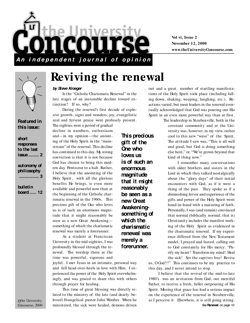Reflections on the last issue
by Michael Healy
I would like to comment on several of the articles in the latest issue of the Concourse. First, in response to Susan C. Fisher’s question, “What is it in the nature of women that makes them prey to the illusion of the ‘prince charming’?”, I would like to suggest that perhaps we have here the true meaning of the last sentence of Gn 3: 16, “Yet your desire shall be for your husband, and he shall rule over you.”
I would also like to add my two cents to Anthony Dragani’s article. I agree with him when he says that gaining an appreciation of the Eastern traditions is vitally important. One of the main stumbling blocks to reunion with the Orthodox is the fear of many of them that reunion with Rome will mean the squelching of their traditions. Only by learning to appreciate Eastern Christianity fully can we quell this fear and heal the schism. And only by healing the breach with the Orthodox, who are the closest to us, will we ever be able to reunite with the Protestants.
Lastly, I wish to respond to Steve Kellmeyer’s little piece. First of all, I think it is wrong to use one great Christian thinker to denigrate another. Duns Scotus may not be a saint (yet), but he has been beatified. Furthermore, when everyone (including Aquinas!) rejected the doctrine of Mary’s Immaculate Conception, Scotus defended it. To reject him because he is not a Thomist is inexcusable, as would be the reverse.
As far as the charge that the philosophy department fails to provide its students with adequate theological foundations goes, this does not fit with my experience as a philosophy major (and now a grad student) here in Steubenville. I read selections from both Bonaventure’s philosophical and theological writings in my Franciscan Philosophy and Medieval Philosophy courses. I audited a Texts of Augustine course (offered by the philosophy department) in which substantial portions of The City of God and De Trinitate were assigned. On my own initiative, I read both books cover to cover (how many theology majors do that?). In my Texts of Newman class we read twelve or thirteen of his sermons. In Renaissance and Early Modern Philosophy we read Pascal’s Pensees, which include as much theology as philosophy. In my Epistemology class the professor read us an article by the philosopher Josef Seifert about why we believe in Christ—hardly a non-theological topic. In both my Intro to Philosophy class and my Philosophy of the Person class we were assigned books by C.S. Lewis. I even wrote a paper on The Abolition of Man. I am currently in Texts of Karol Wojtyla, and I don’t think anyone would question whether that will involve theology as well as philosophy. My Philosophy of Love and Philosophy of Religion classes were deemed to have enough theological content to be cross-listed with theology. No, on the basis of my experience with the philosophy department here I must say that the charge that it fails to provide its students with adequate theological groundings is baseless.
Thirdly, I do not agree that the idea that Thomism is egotistical results either from an appreciation for Scotus or a lack of sound theological foundations. Rather, it comes from a false understanding of the “ethics of eudaimonia” as something self-centered. Furthermore, in my philosophical education here at FUS, I have been given a proper understanding of “eudaimonia” as “fulfillment” rather than “pleasure”.
But my most serious contention with Kellmeyer’s article is his practical assertion that canonization and the status of Doctor of the Church are conferred infallibly. Have we no understanding of Christian Doctrine? Have we completely forgotten the definition of infallibility at the First Vatican Council? Have we become Ultramontanists? Papal infallibility only operates when the Pope, in the exercise of his office as head of the Church and by virtue of that office, defines for the entire Church a matter of faith or morals. The infallibility of the entire episcopate also applies only to matters of faith and morals, and only when they are taught “always, everywhere, and by everyone” or defined at a Church Council. Canonization and conferral of the status of Doctor of the Church do not fall under either of these categories.
A canonization is a statement that we have determined, to the best of our ability, that a given person is in heaven, and therefore can legitimately be prayed to. Being raised to the status of Doctor of the Church is simply official recognition that one’s teachings are, in general, in line with Christian doctrine. As Kellmeyer himself notes, this does not mean that someone is free from error. This, to my mind, proves my point. It seems to me that if the status of Doctor of the Church were infallibly conferred, then it could only be conferred on a thinker who never committed a single theological error. If this were the case, though, Aquinas would not have been named a Doctor of the Church in the first place. Remember, he did not hold the Immaculate Conception. Thus, I think that Kellmeyer’s assertion that Aquinas was infallibly canonized and infallibly made a Doctor of the Church is deeply flawed and misleading and undermines the position he himself is defending. It is based on a false and quasi-heretical idea that everything that Rome says is infallible rather than only those things which the Church herself teaches to be infallibly taught.
Michael Healy, Jr., FUS MA Philosophy Program


